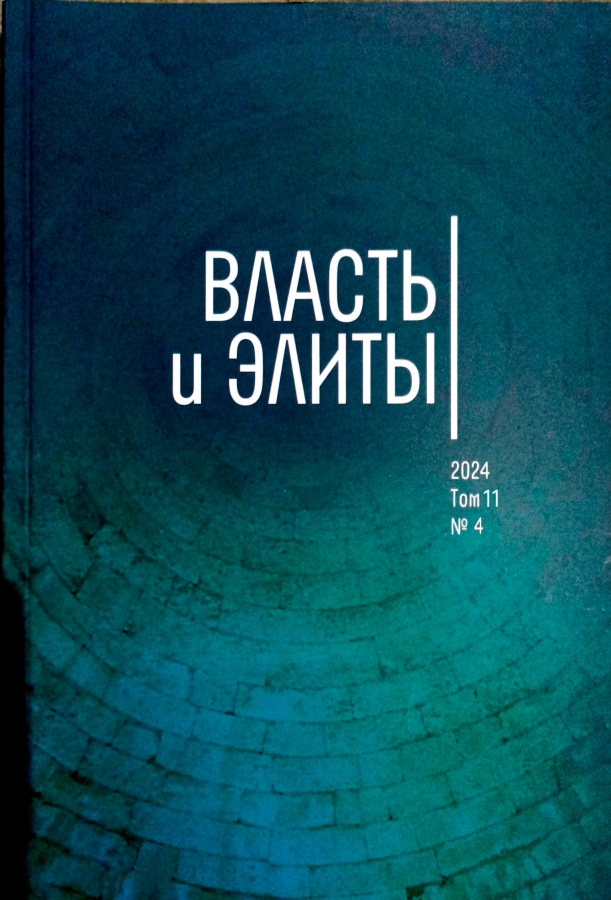Том 11, № 2 (2024)
ВЛАСТЬ И ЭЛИТЫ В РОССИЙСКИХ ГОРОДАХ
Условия и этапы становления политико-административных ассамбляжей в городах Сибири
Аннотация
На примере сравнительного анализа политических процессов в городах Сибири рассматриваются условия и этапы формирования различных типов властных отношений с 1991 по 2021 г. Для объяснения различий в политических траекториях автор, с одной стороны, привлекает концептуальный аппарат теории ассамбляжей мексикано-американского исследователя М. Деланды и строит свои выводы на основе дедуктивного метода, с другой — рассматривает ход и итоги избирательных кампаний в выбранных городах, индуктивно конструируя идеально-типологические модели коалиций победителей. Основным понятием исследования выступает «политико-административный ассамбляж», автономная целостность, состоящая из гетерогенных частей различной природы, способная оказывать принудительную координацию других ассамбляжей на основе легитимного признания за ней права определять целевые приоритеты сообщества, обязательные социальные стандарты и осуществлять контроль над их соблюдением. Ассамбляжи различаются между собой оценками электоральной конкуренции (персонификация — корпоративизм) и прозрачностью административных процедур (прозрачность — аберрация) Таким образом, выделены четыре модели ассамбляжей, две из которых обозначены как «паттерны Гоббса», две — как «паттерны Локка». Для объяснения расхождения процессов формирования различных паттернов сформулирована гипотеза «места», где географическое положение выступает условием, определяющим характер экономических, социальных и культурных проявлений (город-хаб или город административный центр), что во многом задает параметры пространственной, инфраструктурной и информационной среды рассматриваемого города, что, помимо материальной составляющей, находит выражение в символической среде, экспрессивном полюсе (городском гербе), становясь основой городской идентичности (торговый город, индустриальный город, административный центр). Анализ избирательных кампаний показывает смещение локальных политических повесток от комплексов местных проблем (1991–2000), к вопросам местной экономики (2000–2011), артикуляции на местном уровне больших по объемам проблем национального масштаба (2011–2021). Последнее в тенденциях означает унификацию управления и переход к «паттерну Гоббса», что в рамках выбранной теоретической модели неизбежно ведет к снижению социальной активности населения, обеднению символической среды и ослаблению комплексов сигналов о состоянии инфраструктурной среды.
Власть и элиты. 2024;11(2):74-103
 74-103
74-103


ПРОБЛЕМЫ ИССЛЕДОВАНИЯ ЭЛИТ И ВЛАСТНЫХ ОТНОШЕНИЙ
О некоторых актуальных проблемах интерпретации элит в современной политической теории
Аннотация
Исследование феномена политических элит в политической теории имеет множество измерений. В своем современном виде концептуальные основания интерпретации элит сформулированы более столетия назад в трудах В. Парето, Г. Моска и Р. Михельса, проникнутых беспрецедентным реализмом и стремлением применить научные методы к изучению политики. Аналитика элит, эволюционировавшая на протяжении столетий под воздействием самых различных детерминирующих факторов, тем не менее всегда сохраняла связь с классическими парадигмами, восходящими к политической философии раннего модерна, которая, в свою очередь, была тесно связана с традицией античной политической философии — от Пифагора и ранних софистов до Платона и Аристотеля. В этом плане практически все новейшие интерпретации так или иначе включают в себя, спонтанно или целенаправленно, некий «традиционалистский» элемент. Исходной предпосылкой является очевидная констатация, согласно которой все общества управляются элитами и каждое общество имеет определенные средства создания своих элит. Анализ последних предполагает необходимость установления четких различий между обществами, обладающими механизмами создания элит, и обществами, которые не создают институциональных условий для их формирования. В современной политической науке анализ проблем, связанных с политическим статусом и амбициями элит довольно часто осуществляется в рамках дихотомии «теория элиты vs теория демократии». Вместе с тем демократическая теория и теория элит в их современном состоянии по определению не могут рассматриваться как сугубо научные, или «дескриптивные», поскольку на любом из этапов их эволюции они органически включали в себя ряд элементов, характерных для нормативной политической теории. Многие ученые открыто признают, что концепция элиты чревата проблемами, а непредсказуемая природа выбора элиты может стать преградой для теоретического прогресса (Д. Хигли, М. Бертон и др.). Такие выводы в определенном смысле коррелируют с некоторыми постулатами «позитивной политической теории», которая весьма активно развивается в западной политической мысли с начала XXI в. «Статистика споров» внутри позитивной политической теории свидетельствует о том, что в последние годы одной из ее наиболее чувствительных «болевых точек» становится «гипотеза демократического мира». Главный постулат, лежащий в основе этой гипотезы, состоит в том, что либеральные демократии редко или никогда не воевали друг с другом: войны происходили и могут происходить только между автократиями или между демократиями и автократиями. Многие противоречия и теоретические сомнения в отношении гипотезы демократического мира вызваны, по большей части, острой дискуссией, развернувшейся вокруг работ американского политолога Дж.Л. Снайдера, в которых данная гипотеза была подвергнута бескомпромиссной критике. Основной довод Снайдера заключается в том, что традиционные автократические элиты, столкнувшись с ситуацией, когда распространение демократии начинает угрожать их власти, создают «эксклюзионистские» этнические националистические режимы. Защищая собственные интересы, они вполне «рациональным» образом провоцируют националистические конфликты. Аналитика Снайдера в специфическом плане соприкасается и с так называемой минималистской концепцией демократии. Ее возникновение во многом связано с гипотезой, обоснованной в середине ХХ в. Кеннетом Эрроу. На уровне нормативной политической теории попытка преодоления обозначенных выше философских проблем и моральных дилемм довольно рельефно представлена в работах Патрика Денина — одного из наиболее ярких представителей современного американского консерватизма. Исходным моментом инициированный им дискуссии являются все те же опасения относительно нарастания «нео-олигархических тенденций» в современных западных демократиях. В «проекте» самого Денина, намеченном исключительно в общих чертах, элементы классической политико-философской концепции «смешанной конституции» причудливо соединяются с футорологическими прогнозами, отмеченными стремлением к «консервативному синтезу».
Власть и элиты. 2024;11(2):7-34
 7-34
7-34


РОССИЙСКИЕ ЭЛИТЫ: ФУНКЦИОНИРОВАНИЕ И ПЕРСПЕКТИВЫ РАЗВИТИЯ
Профессионально-личностный потенциал отечественной политической элиты: факторы и векторы современных изменений
Аннотация
Рассматривается достаточно актуальная сегодня проблема личностного и профессионального потенциала одной из ведущих страт современного общества — политической элиты. Именно он и должен формировать облик самой элитной личности, отличающий ее от других социальных субъектов, как отдельных личностей, так и групп. В появившихся в последнее годы исследованиях большее внимание обращается на психологические и аксиологические особенности базовых черт и структуры личностного либо профессионального потенциала, выявляются особенности их проявления в различных социальных группах, в том числе у государственных служащих. В рамках настоящего исследования автор останавливается прежде всего на особенностях профессионально-личностного потенциала элиты. Именно он, а не личностно-профессиональный потенциал определяет базовую специфику со вре менной элиты России, где доминирующими остаются факторы мобилизационного развития с превалированием политико-статусной составляющей. Реализуя поставленные цели, автор уделяет внимание анализу как объективных (цивилизационного и регионального плана), так и субъективно-личностных факторов (в том числе влияния процессов социализации, поколенческих, демографических, образовательных, карьерных траекторий). Их рассмотрение (вместе с контент-анализом биографий 671 представителя федеральной и 165 региональной элитных групп (на примере типичной по 26 экономическим показателям Саратовской и столь же типичной для Среднего Поволжья Волгоградской областей) позволило сделать вывод о формировании особого гибридного типа именно профессионально-личностного потенциала, в котором на первые позиции выходят формально-позиционные характеристики, подавляющие (но при этом в ряде случаев не исключающие) характеристики креативно-личного плана.
Власть и элиты. 2024;11(2):35-52
 35-52
35-52


ФОРМИРОВАНИЕ ОБЩЕНАЦИОНАЛЬНОЙ ЭЛИТЫ
Социальное структурирование участия в выборах Государственной Думы 2021 г.
Аннотация
Исследования в Западной, Центральной и Восточной Европе показывают, что участие в парламентских выборах структурировано по демографическим и социально-структурным основаниям — отчетливо растет с возрастом и при повышении социально-экономического статуса, отражая различия в политической подготовленности избирателей, мотивации и возможностях их мобилизации. Обсуждаются демографические и социально-структурные неравенства участия в выборах Государственной Думы 17–19 сентября 2021 г. Для выявления таких неравенств осуществлялся логистический регрессионный анализ данных репрезентативного российского опроса, выполненного по программе ISSP в 2022 г. Результаты свидетельствуют, что электоральное участие на этих выборах тесно связано с возрастом: среди младших избирателей преобладали абсентеисты, тогда как большинство старших в голосовании участвовали. Такая зависимость, как было нами установлено ранее, возникает вследствие постепенного повышения с возрастом интереса к политике и партийной идентификации и отчасти может указывать на отношения клиентелы между властью и пожилыми людьми, получившими накануне выборов заметные денежные выплаты. В согласии с теорией «ресурсы — мотивация — мобилизация» высокое образование и доходы также способствуют электоральной активности, с ней сопряжены и трудовая занятость, членство в профессиональных союзах, посещение религиозных служб. Кроме того, результаты подкрепляют теоретические предположения о принудительном голосовании зависимого от властей населения: работники государственного сектора экономики, особенно младших и средних возрастов, делают это заметно чаще, чем занятые в частных фирмах или вовсе не работающие. Правда, не удалось обнаружить различий между городским и сельским населением, хотя считается, что на последнее властям также легче воздействовать. Региональные сопоставления добавляют уверенности, что самые высокие официальные показатели явки в республиках Северного Кавказа, которые по опросным материалам оказываются, напротив, самыми низкими, появляются вследствие массовых махинаций со стороны их руководства.
Власть и элиты. 2024;11(2):53-73
 53-73
53-73












